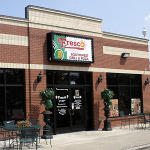We all know what happens when a restaurant is getting ready to open. Projected opening dates get pushed back due to construction or licensing/permit delays. There’s a predictable shuffle of executive chefs, sous chefs, line cooks, general managers, bartenders and servers culled from other establishments in town. There are lots of bills for interior decorating and the first flush of new stemware, china and flatware. Finally, when the liquor license is granted at last: a “soft opening” or friends and family night. Kudos all around. Back-slapping. Rounds of beer bought for new staff at a local bar.
But what happens when a restaurant closes?
We’re not talking about places that close purposely, whose owners want to retire, or move and re-tailor their concept. We’re talking restaurants that simply fail, for whatever reason in a minefield of possible reasons: cash flow, slipshod management, owners who “rob” their own business for personal living expenses. Even just poor planning or simple bad luck (not enough parking, crappy menu writing, less than laser-focus on food and labor costs). Profit margins are thin even in the best-run restaurants. Toss in one or more of these other complications and it can be over within months or even weeks.
First, let’s rewind to before the doors actually close. Our industry is fairly tight-knit, and everybody knows somebody who works at a place that’s getting ready to go under. Whispers of discontent can be heard around town. Invoices might get paid, but the checks may bounce and get replaced with promises. “They’re on COD (cash on delivery) with their vendors,” you’ll hear. Or worse: vendors simply stop taking orders from the establishment, and stop delivering altogether.
The owners know this is happening. The chef usually knows because she’s the one who has to deal with the suppliers. Sometimes it takes awhile for the employees to catch on, but an uneasy feeling starts to permeate the restaurant. That sense of optimism ebbs away. Owners might start making their exit plans, but rarely clue in the rest of the staff. It’s a catch-22. As an owner or manager, it’s unrealistic to say to your staff, “OK, we’re not doing so well, maybe you should all consider looking for new positions, but we’re going to try to make it another month.” You’d be a ghost town within a few shifts. The reality is, most line or prep cooks — and many of these work paycheck-to-paycheck — will only be clued in when that paycheck bounces or is un-cashable (Bank teller: “I’m sorry, there are no funds available to cash this”). Servers may end up even worse off, since the bulk of their income is what they take home in cash-out every night. They’re socking it away, in a bank account or a sock drawer, for the rent. When they come to work one day and the doors are locked, panic sets in.
Thankfully, I’ve only ever worked for one failing restaurant. But I’ve been there, tugging at that locked door, with a panicking server beside me. She was wondering aloud what she was supposed to do about the LG&E bill that was due in two days. I was wondering how I’d recover all the overdraft fees my bounced paycheck caused in my bank account. (Answer: I never did.)
Vendors with unpaid invoices have the option of paying an attorney to put a lien on any sale of the business — assuming there’s a “business” of any value left to sell — or remaining assets (appliances, furniture, fixtures, et cetera) and can hope to recoup their money that way. The dishwasher, the busboy, the 20-year-old hostess? Not so much. It’s not like when a corporation dissolves and everyone gets severance pay and free career counseling to assist in a job search. The newly unemployed restaurant worker won’t be able to meet tuition and textbook expenses for themselves, or daycare expenses for their kids. Parents and roommates have to take up the slack for their part of the bills until they find a new gig.
What can you, as a patron, do if one of your favorite places seems to be faltering? Give an extra-big tip once in awhile if you can afford it (and don’t forget the kitchen). Include your business card with the check and offer to act as a reference if you feel quality staff may be job-hunting soon. Most of all, keep coming back, and vote with your feet. It means more than you can imagine.
Marsha Lynch has worked at many Louisville independent restaurants including Limestone, Jack Fry’s, Jarfi’s, L&N Wine Bar and Bistro, Café Lou Lou, and Marketplace @ Theater Square.




